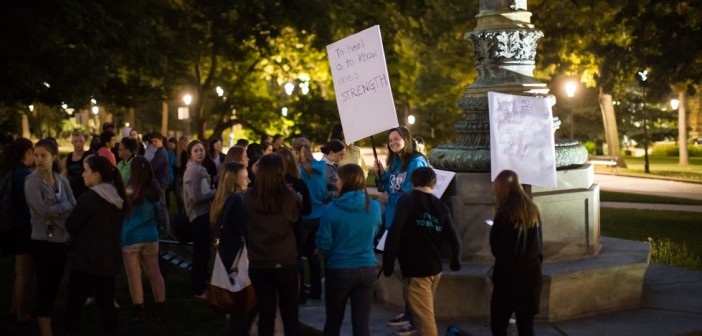More than 90 percent of victims don’t report their sexual assault to the police.
This is the fact that Break the Silence members Samantha Dipaolo, ’16, and Katie Jalboot, ’17, revealed to their audience at the start of this year’s Take Back the Night, which was held on Monday. The event, held every year on Lehigh’s campus and across the country, consists of a silent march and a speak out, during which survivors of sexual assault can share their stories.
The event is distinct in that it is set up to be a safe space for survivors to share their experiences without the repercussions and criticism that may follow a public announcement. Brooke DiSipio, the director of the Office of Gender Violence Education and Support, said she and BTS work closely with Lehigh’s general counsel and the campus police to ensure the event’s environment is as confidential and safe as possible.
“Outside of events like Take Back the Night, the only confidential spaces on campus are the counseling center and the chaplain’s office,” DiSipio said. “All other faculty and staff are mandated reporters.”
But during Take Back the Night, DiSipio explained that the university is required to act only if a speaker reveals something that would indicate a threat to the larger campus community. Otherwise, survivors are invited to speak freely about their experiences and receive the support of the community gathered at the event.
This opportunity for a survivor to speak out is instrumental for the healing process.
“We know that for survivors of sexual assault and gender violence specifically, there is this culture of silence,” DiSipio said. “We know that literally the number one thing that determines whether someone transfers from victim to survivor is if the people they tell believe and support them. So being able to tell people and have 200 people support you…you can’t replicate that type of healing and experience.”
BTS member Claire Hawley, ’15, shared her story for the first time at last year’s Take Back the Night and said the experience was transformative.
“For me, it was just finally telling my story after 10 years of being told that it didn’t happen to me, and just being able to say to everyone that it did happen and I’m not a liar,” she said. “And just coming to terms with that personally was a huge thing for me in recovering.”
Allison Gulati, the associate dean and director of strategic initiatives, said speaking out can be an empowering experience for a survivor.
“Every time they tell their story from a place of strength, where they own that story and they have the opportunity to share it on their terms, it helps them more fully come to terms with what has happened and to assure themselves that they have the resources and the ability to get through it,” she said.
DiSipio echoed Gulati’s sentiments and stressed the significance of the event as “one of the few times that survivors can come together and feel supported and feel believed and feel listened to.”
And for Dipaolo, the creation of that safe space speaks to the power of the event, particularly on Lehigh’s campus.
“I think it’s rare, especially in the community at Lehigh,” she said. “There are a lot of zones that people don’t feel safe in, and this is just one of them that when people are in it, they know they’re safe. They know that the frat boy sitting next to you…if he’s sitting here, he’s sitting here for a reason. And when you’re at a party, you’re not feeling that.”
Hawley and Dipaolo hope that events like Take Back the Night and organizations like BTS will begin to be more visible on campus, particularly with a national conversation being sparked about sexual assault on college campuses.
“It’s just really powerful that big government organizations and private organizations are coming out with steps to intervene and stop this from happening,” Hawley said. “It’s not going to stop sexual assault from happening, but it might give people the chance to speak up about it and feel comfortable and not feel like they have to stay silent.”
Gulati said as national conversation and policy change, Lehigh must adapt its approach to the issue of sexual assault. In the 13 years that she has been on campus, she said Take Back the Night and the campus approach to sexual assault have changed significantly.
“Often times, our need to ask survivors to at least talk to the police for a minute has changed, and some of that is to make sure we’re keeping our campus as safe as possible,” she said. “I am also so proud of so many of our survivors who are different than they may have been five or six years ago and are now willing to share that information with a conduct office…and go forward with a process that makes sense.”
Despite the spark in conversation, DiSipio said that it is unlikely national efforts will lead to a huge shift in campus climate around sexual assault.
“Regardless of nationally what’s happening, it really is on everyone to take a commitment,” DiSipio said. “Everyone on our campus needs to buy into that and really change our campus culture.
“So the national news, the White House isn’t going to change Lehigh culture,” she said. “Lehigh people are going to change Lehigh culture.”






Comment policy
Comments posted to The Brown and White website are reviewed by a moderator before being approved. Incendiary speech or harassing language, including comments targeted at individuals, may be deemed unacceptable and not published. Spam and other soliciting will also be declined.
The Brown and White also reserves the right to not publish entirely anonymous comments.